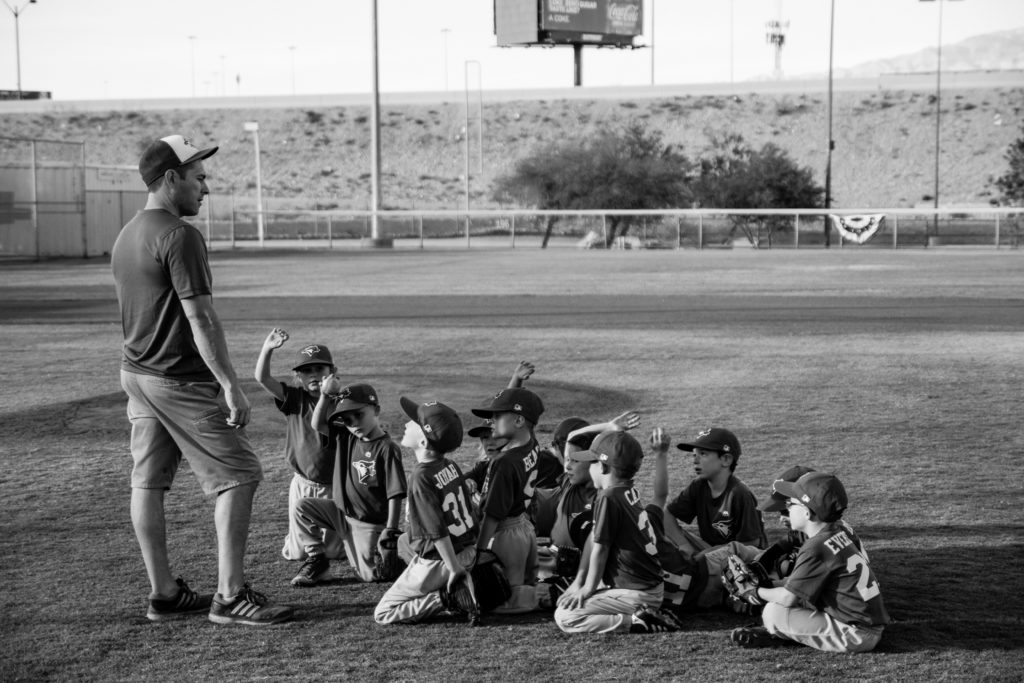What a Team of 7-Year-Olds Taught Me About Accountability
I have given talks to packed auditoriums.
I have presented to Executives seated in fancy Manhattan office buildings.
I have navigated the challenges of leading a business through COVID.
I have even done family succession planning with my sisters.
Yet, all these fail in comparison to the uphill climb of coaching a seven-year-old baseball team.
Nothing is more taxing.
You are probably accusing me of being a little over-dramatic right now, but you don’t understand the team I helped coach this fall. They knew all the levers to pull. Their behavior often had me morph into an American version of “Roy Kent.” At least I said “Oy,” and not any of the other Roy Kent’isms (and if you don’t know who Roy Kent is, you need to stop reading this post and start watching Ted Lasso. Ted will teach you how to become someone worth following).
Back to my post.
At one of our practices… Yeah, our coach thought seven year olds would want to come to baseball practice after going to school all day. I’m sure they were little angels for their teachers, but for us?
Oy!
Anyhow, at one of our practices I was in charge of teaching them how to hit. The talent level on our team ranged from “I have never touched a baseball bat in my life” to “my dad has thrown me BP for the last five years.”
Did I mention they were seven?
So, needless to say, I was teaching them the basics. We had broken the group into smaller groups to keep them active. I (wrongly) assumed that since I was leading the hitting station, the kids would pay attention. After going through the proper setup and a few other basic techniques, each kid was given the opportunity to hit off a tee. The goal was to hit the ball straight up the middle at a box on the fence that was about 5 feet away. Naturally, the kid whose dad had been throwing him BP for five years came up first. He had a swing that took days to develop, but he made great contact everytime. This improved my confidence level. Yes, mine. Maybe I could do this I thought. Then I realized that two of the kids were chasing one another with a bat.
Oy!
The one thing I do not put up with is safety violations. In my years of coaching, I have yet to have a kid get hurt. Thanks be to God.
So, after I laid the ground rules (again, I might add), I had the group back together. I tried to go all “Simon Sinek” on them by explaining “why” watching others practice hitting helped them become better. It was a stretch because they were hitting off a tee. But, I had to go with what I had. Amazingly, it worked. They even began cheering each other on as they hit. But about five minutes later, I saw two kids on the bench chatting it up. One of them happened to be MY SON. What!? That little Benedict Arnold, I thought (his name is actually Ben). Sarah’s calming voice immediately came to my head. Still, I was steaming. How could Ben be one of the kids not listening? I sternly informed Ben that he needed to pay attention. He quasi-ignored me. So, I did what all dads have done since the dawn of time, I pressed on. Ben then back-talked to me. He told me that he was bored. I told him that I did not care (always effective) and that he needed to come rejoin the team. He then basically said “no.”
Oy!
I had all the kids looking at me now. It was as if they had put Ben up to this. It was as if they all were in cahoots to see how far they could push me. How much candy did they offer Ben, I wondered? Thankfully, Sarah’s calming voice once again filled my head. “They are only seven, Alex,” she would say. Still, I informed Ben that he had to go on a run for back-talking to me. But, I said this very calmly as I pointed to the outpost (that really wasn’t very far away) and told him to run to it and back. He then pleaded with me, but, I held my ground.
The kid whose dad has been throwing him batting practice for five years gave me a nod of approval. So, I finally had one on my side. Ok, I made that up. But, it feels like it could have happened because that kid was a stud. He got a bunch of huge hits for us during the year. I hope to have his baseball card someday.
Back to the story….. To Ben’s credit, he put his head down and ran. He even ran hard. He then came back and took his turn in the batter’s box. A few minutes later something happened that I was not expecting. Ben came up to me, hugged me, and told me he loved me. I told him that I loved him more than I could put into words. It was a real moment, the kind that makes me think about James Earl Jones’ famous baseball speech in the Natural. Then again, I always think about the Natural when something cool happens on a baseball field… I took this opportunity to tell Ben that my discipline was out of love and wanting the best for him. We are a family, I said, one that is respectful to those in authority. We do not back-talk. We may voice an opposing viewpoint, but we do so with respect. I also told him how proud I was of him for running hard and doing what I asked the second time. It was a real moment for us.
While the rest of that practice certainly did not fly by, the rest of the season certainly did. Ben grew in many ways, and so did his teammates. By the end of the season, their development was shocking to all the parents, especially me. This happened in part because all four coaches — this team commanded four coaches to keep it in order!—came together and created an environment of accountability. It sounds so basic because it is. Yet, we had to continually push ourselves out of our comfort zones given the hovering nature of modern parents. To be clear, we did not want to be jerks. We just wanted to run an organized baseball team. To that end, I think we were successful.
I share this story because it reminded me that it is my job to do the same at Hoffer Plastics. Accountability is not rocket science. It is simply honest feedback, done so without being a jerk. When given appropriately, you will gain others’ respect.
It is also the loving thing to do.
What a Team of 7-Year-Olds Taught Me About Accountability Read More »










